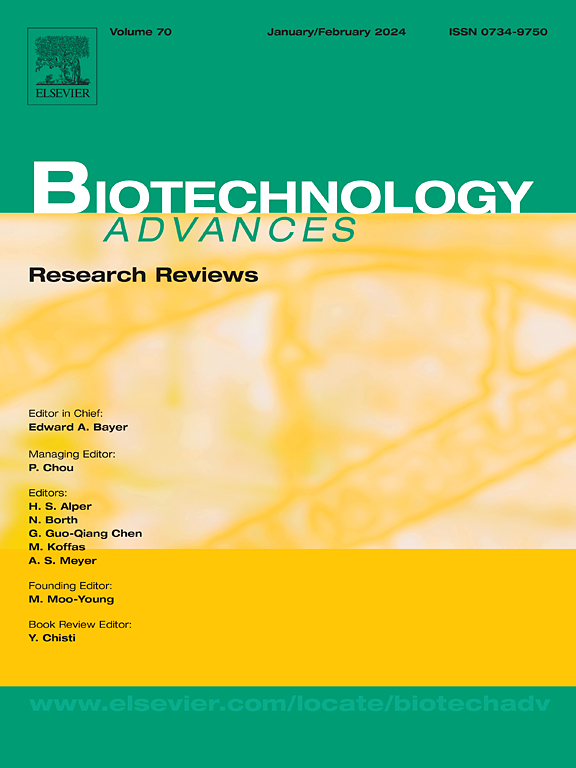Mild hypothermia: Insights and implications for productivity in mammalian and insect cell cultures
IF 12.5
1区 工程技术
Q1 BIOTECHNOLOGY & APPLIED MICROBIOLOGY
引用次数: 0
Abstract
Mammalian cells are the preferred expression system for obtaining recombinant proteins (r-proteins) due to their ability to generate human-like glycosylation patterns. However, their slow growth and lower productivity compared to prokaryotic host cells, coupled with the rising demand for complex therapeutic proteins in the biopharmaceutical market, have driven the search for alternatives to boost productivity. In this context, mild hypothermia (MH) has emerged as a valuable tool for enhancing both the viability and productivity of r-proteins in mammalian as well as some insect-derived cell lines. Notably, the impact of MH varies depending on the r-protein and cell line, and is influenced by factors such as promoter type, temperature reduction methods, supplementation, pH, and operational conditions. MH can affect substrate synthesis, toxic metabolite production, and post-translational modifications of r-proteins, particularly glycosylation. At the molecular level, MH influences processes such as cell cycle arrest, apoptosis delay, mRNA stability, protein synthesis, cytoskeletal reorganization, and the induction of endogenous transcription factors, all of which can contribute to increased productivity and viability in cell cultures. This review addresses key considerations regarding the application of MH in mammalian and insect cell cultures and provides a comprehensive overview of the molecular mechanisms underlying its effects. It also identifies potential targets for cell engineering that could further enhance r-protein production.
亚低温:对哺乳动物和昆虫细胞培养生产力的见解和影响
哺乳动物细胞是获得重组蛋白(r-蛋白)的首选表达系统,因为它们能够产生类似人类的糖基化模式。然而,与原核宿主细胞相比,它们的生长缓慢,生产率较低,再加上生物制药市场对复杂治疗蛋白的需求不断增长,促使人们寻找替代品来提高生产率。在这种情况下,亚低温(MH)已经成为一种有价值的工具,可以提高哺乳动物和一些昆虫来源的细胞系r-蛋白的活力和生产力。值得注意的是,MH的影响取决于r蛋白和细胞系,并受到启动子类型、温度还原方法、补充物、pH和操作条件等因素的影响。MH可以影响底物合成、有毒代谢物的产生和r蛋白的翻译后修饰,特别是糖基化。在分子水平上,MH影响细胞周期阻滞、细胞凋亡延迟、mRNA稳定性、蛋白质合成、细胞骨架重组和内源性转录因子的诱导等过程,所有这些都有助于提高细胞培养的生产力和活力。本文综述了关于MH在哺乳动物和昆虫细胞培养中的应用的关键考虑因素,并提供了其作用的分子机制的全面概述。它还确定了细胞工程的潜在目标,可以进一步提高r蛋白的生产。
本文章由计算机程序翻译,如有差异,请以英文原文为准。
求助全文
约1分钟内获得全文
求助全文
来源期刊

Biotechnology advances
工程技术-生物工程与应用微生物
CiteScore
25.50
自引率
2.50%
发文量
167
审稿时长
37 days
期刊介绍:
Biotechnology Advances is a comprehensive review journal that covers all aspects of the multidisciplinary field of biotechnology. The journal focuses on biotechnology principles and their applications in various industries, agriculture, medicine, environmental concerns, and regulatory issues. It publishes authoritative articles that highlight current developments and future trends in the field of biotechnology. The journal invites submissions of manuscripts that are relevant and appropriate. It targets a wide audience, including scientists, engineers, students, instructors, researchers, practitioners, managers, governments, and other stakeholders in the field. Additionally, special issues are published based on selected presentations from recent relevant conferences in collaboration with the organizations hosting those conferences.
 求助内容:
求助内容: 应助结果提醒方式:
应助结果提醒方式:


